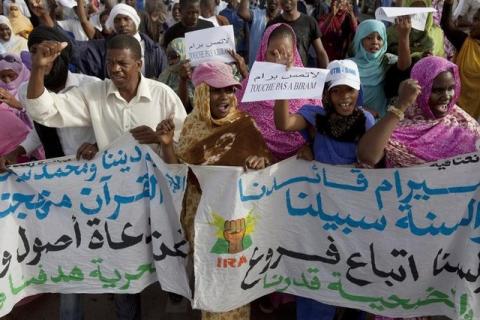Advertisement
Mauritania stifling jailed anti-slavery activists - U.N. experts
DAKAR (Reuters) - U.N. human rights officials accused the Mauritanian government on Wednesday of stifling anti-slavery campaigners jailed for up to 15 years for their alleged role in protests against forced eviction in the capital.
The West African country jailed 13 members of the Resurgence of the Abolitionist Movement (IRA) in August for taking part in protests by residents of a slum in Nouakchott in June, many of whom were former slaves.
The activists said they were not present at the protests and that the trial was an attempt by the state to discredit the IRA.
"The government is hostile to civil society groups that criticise its policies, especially to groups like IRA, whose members are drawn from the Haratin minority and advocate for an end to slavery," seven U.N. special rapporteurs said in a statement.
They said they were concerned the IRA had been targeted by the government because its members met Philip Alston, U.N. special rapporteur on extreme poverty and human rights, during his visit to the country in May.
Mauritanian government officials were not immediately available to comment.
Mauritania was the last country in the world to abolish slavery in 1981. The Haratin, who make up the main "slave caste", are descended from black African ethnic groups in the south, and often work as cattle herders and domestic servants.
Today some 43,000 people or at least one percent of the population live as slaves, according to the 2016 Global Slavery Index. Yet other estimates put the number as high as 20 percent.
The activists' trial in August was marred by serious rights violations, the U.N. experts said, citing reports of torture in detention and irregularities during the court proceedings.
The jailed activists were moved last month from Nouakchott to a detention centre in northern Zouérate, where they have been cut off from their families, doctors and lawyers, the IRA said.
"This is yet another indication that these proceedings are politically motivated and intended to suffocate those that promote human rights and oppose government policies," the U.N. officials said. "Anti-slavery activism cannot be a crime."
The activists have appealed their sentence, with a date for an appeal to be set this week, the special rapporteurs said.
Biram Dah Abeid, head of the IRA, said last month that the state had intensified a crackdown on its activists in response to the growing anti-slavery movement in the country.
The jailing of two slave-owners in May and the release of Abeid and activist Brahim Bilal, who had been in prison for 18 months after being part of an anti-slavery march, were hailed as a turning point in the fight to end the practice.
But Anti-Slavery International called the August sentences a "devastating blow" to the country's anti-slavery movement.
(Reporting By Kieran Guilbert, Additional Reporting by Nellie Peyton, Editing by Katie Nguyen)



















Add new comment